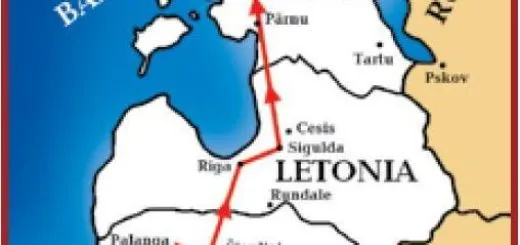
Cryptocurrencies are gaining popularity in the Baltic states, where comprehensive regulations have not yet been introduced. Companies from multiple sectors, including real estate, online commerce, the hospital services industry and even medical care, are taking advantage of crypto markets. Some companies in the region already offer their services worldwide.
Likewise, businesses are already being made with real estate such as apartments sold and negotiated with Bitcoin. Cryptocurrencies are increasingly accepted in Lithuania, Latvia and Estonia, where buying a cup of coffee with bitcoin is not uncommon these days. Cafes, bars, restaurants, hotels, souvenir shops and even an orthopedic clinic are accepting cryptos, according to local media. It seems that the Baltic Tigers of the EU are becoming the "Bitcoin Tigers" of Europe.
Several companies that sell land and housing units in the Baltic countries have introduced crypto payments in real estate, reports Novaya Gazeta. Potential buyers will soon be able to buy land and housing in the settlement of the Auriai hut, which is currently under construction near Vilnius, the capital of Lithuania.
Real estate with coded prices is also sold in neighboring Latvia and Estonia. The Latvian branch of Baltic Sotheby's International Realty is offering apartments in the attic in Jūrmala to be canceled with bitcoin. Recently, the Estonian real estate agent LAAM Kinnisvara announced that it is accepting cryptocurrencies for apartments in the city of Maardu, 15 minutes by car from Tallinn. A third of the 44 units built by the company have already been sold. The next agreement with Bitcoin is scheduled for next week.
It is mentioned that other products that can be marketed is clothing. More than 30 locations in Vilnius accept crypto payments, in Tallinn there are 26 and in Riga, 21, according to Coinmap. Bitcoin ATMs can be found in the capitals of Estonia and Lithuania, according to Coinatmradar. Most of the companies that accept cryptos come from the hotel industry: cafes, bars, restaurants, souvenir shops, several hotels. Other sectors, however, are catching up with this new innovation quickly.
About a month ago, the United Colors of Benetton franchise in Lithuania announced that it would accept cryptocurrencies. The fashion brand stores in Vilnius now take bitcoin, ethereum, dash, NEM and Steem through a partnership with Coppay. The Belarus-based payment provider offers instant conversion to Fiat at an exchange rate based on data from multiple markets. "Our employees like it because it's simple and easy. No additional training was needed, "said Arturas Zuokas, co-owner of the company and former mayor of Vilnius.
By the way, Lithuania already has a platform similar to the one maintained by Coppay. The local company Coingate recently signed an agreement with a French developer of online payment solutions. Through this partnership with Prestashop, Lithuanians plan to provide services to 80,000 merchants around the world.
It is mentioned that bitcoin is not yet regulated. Integral regulations have not yet been adopted in any of the Baltic states. Latvia has recently attempted to partially recognize cryptocurrencies for tax purposes. Authorities in Riga said the bitcoin could "function as a means of exchange." As a result, a 20% tax on the capital gains of the cryptocurrency transactions will be imposed.
Estonia, possibly the most digitally developed Baltic country, has been thinking about issuing its own cryptocurrency. Tallin does not renounce the idea, despite the negative attitude of the European Central Bank. Officials behind the project are still pushing to issue "estcoin," not as cryptography, but as a token. In any case, Estonia is determined to continue with its plans for a national currency.
The Central Bank of Lithuania, which was opposed to cryptocurrencies for some time, has just begun consultations with representatives of the cryptographic sector on a possible regulatory framework. "The blind denial, the reluctance to understand and work with the world of cryptocurrencies does not get us anywhere," said a senior Lietuvos Bankas official last week.
The cryptocurrencies in various countries have great potential to be part of the financial industry, users see an opportunity to make use of a system that is increasingly popular, the blockchain-bitcoin technology has all the attributes to show that the economy is a one of the fundamental pillars for the countries